Could A Dark Big Bang Explain Dark Matter?

Discover more detailed and exciting information on our website. Click the link below to start your adventure: Visit Best Website tecfai.com. Don't miss out!
Table of Contents
Could a Dark Big Bang Explain Dark Matter?
The universe, as we know it, is a perplexing place. While we can observe galaxies spinning faster than they should, gravitational lensing warping light around unseen mass, and the large-scale structure of the cosmos, a significant portion remains shrouded in mystery: dark matter. This elusive substance makes up approximately 85% of the matter in the universe, yet it doesn't interact with light or ordinary matter in any way we can currently detect. Could a radical new theory, involving a separate "dark Big Bang," hold the key to understanding its nature?
The Standard Model's Shortcomings
The standard cosmological model, ΛCDM (Lambda Cold Dark Matter), successfully explains many aspects of the universe's evolution. However, it relies on the existence of dark matter as a placeholder, a mysterious substance with gravity but no other readily observable interactions. Its exact composition remains unknown, with leading candidates including Weakly Interacting Massive Particles (WIMPs) and axions. Despite extensive searches, direct detection of these particles has remained elusive.
This lack of direct evidence fuels the exploration of alternative theories. One particularly intriguing idea suggests that dark matter might not be a single type of particle but instead a consequence of a separate, parallel universe undergoing its own Big Bang.
The Dark Big Bang Hypothesis: A Separate Creation?
The "dark Big Bang" hypothesis proposes that our universe wasn't the only one born from a primordial singularity. A concurrent, separate Big Bang created a parallel universe composed entirely of dark matter. This dark universe wouldn't interact electromagnetically with our own, explaining its invisibility. However, gravitational interactions would still occur, allowing the two universes to influence each other.
This model offers a potential explanation for several cosmological puzzles:
- Dark Matter Distribution: The intricate distribution of dark matter in galaxies and galaxy clusters could reflect the structure formed within this separate dark universe.
- Galaxy Rotation Curves: The unexpectedly high rotation speeds of galaxies could be a result of the gravitational pull from both the visible matter within our universe and the dark matter from the parallel universe.
- Cosmic Microwave Background Anomalies: Certain inconsistencies in the cosmic microwave background radiation, the afterglow of the Big Bang, could be explained by interactions between the two universes.
Challenges and Future Directions
The dark Big Bang hypothesis, while elegant in its simplicity, faces significant challenges. The primary hurdle is the lack of direct observational evidence. Testing this theory requires finding ways to detect interactions between our universe and a hypothetical dark universe. This could involve looking for subtle gravitational effects or analyzing the properties of gravitational waves.
Furthermore, the hypothesis needs to be refined to address existing cosmological models. It must explain how a separate dark Big Bang could have occurred alongside our own and what mechanisms might govern interactions between the two universes.
Developing testable predictions is crucial. For example, if certain anomalies in the cosmic microwave background or the large-scale structure of the universe can be uniquely attributed to interactions with a dark universe, this would provide significant support for the hypothesis.
Conclusion: A Promising Avenue of Research
The dark Big Bang hypothesis remains highly speculative, but it represents a fascinating and potentially fruitful avenue of research. While the existence of a separate, dark universe seems far-fetched, the mystery of dark matter demands that we consider even the most radical possibilities. Further investigation, theoretical refinement, and the development of innovative experimental techniques are needed to determine whether this intriguing idea holds the key to unlocking the secrets of our universe’s unseen component. The journey to understanding dark matter is ongoing, and the dark Big Bang is just one of the many promising paths scientists are pursuing.

Thank you for visiting our website wich cover about Could A Dark Big Bang Explain Dark Matter?. We hope the information provided has been useful to you. Feel free to contact us if you have any questions or need further assistance. See you next time and dont miss to bookmark.
Featured Posts
-
Prayer Points Open Heaven December 1 2024
Dec 01, 2024
-
Cottons Record Breaking Nbl Game
Dec 01, 2024
-
Close Loss Australia Vs Brazil
Dec 01, 2024
-
Lakers Fall To Thunder Sgas 36
Dec 01, 2024
-
Trump Nominates Kushner Ambassador To France
Dec 01, 2024
